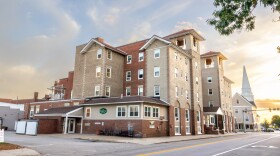New Hampshire lawmakers are attempting a new way to increase housing in the state: expanding accessory dwelling units.
The House Special Committee on Housing is rallying behind a bill that would require cities and towns to allow owners of single-family homes to build two accessory dwelling units on properties of a half acre or more. Currently, municipalities must allow those owners to build one accessory dwelling unit by right, but they can impose some additional restrictions.
Proposed by Rep. Ellen Read, a Newmarket Democrat, House Bill 423 is being tweaked by the committee this summer in order to reduce towns’ abilities to discourage ADUs by adding onerous requirements.
Read has called the expansion a non-intrusive way to create “gentle density,” allowing housing to be built that doesn’t take the form of large apartment buildings. The bill comes as surveys indicate that many in New Hampshire have cited housing availability as the most important issue facing the state and have expressed support for more development.
“You’re spreading out the increased units we need for our market,” Read told the committee in a meeting Tuesday. “Rather than having several large complexes go up that total 60,000 units, you’ll have this kind of ‘Victory Garden’ decentralized approach to increased units on the market.”
The Special Committee on Housing was created by Speaker Sherman Packard early this year in order to evaluate and advance legislation to increase housing in the state; the committee has been meeting and hearing testimony this year, and plans to bring a number of bills forward in the 2024 session.
But while a majority of committee members said they would support the bill, one Republican representative voiced doubts, and said the bill would remove the ability for towns and cities to control the visual appeal of their neighborhoods. Those concerns may signal coming hurdles for the bill in the House and Senate.
“This bill basically takes your single-family neighborhoods — people like them; that’s why they shop there and buy there; they’re invested in the neighborhoods and they know everybody — and it turns them into a potential apartment type of development,” argued Rep. Thomas Walsh, a Hooksett Republican and a member of the committee.
Accessory dwelling units are independent residential units that homeowners can build within or attached to their existing homes. The units must have arrangements for sleeping, cooking, eating, and sanitation that are separate from the main residence, and they are designed for tenants, relatives, or acquaintances to live independently.
The accessory dwelling unit law, passed in 2017, was meant to give homeowners options for increasing their income, taking care of older relatives, and providing housing opportunities amid a growing state shortage.
But there is little data demonstrating how effective the law has been in increasing the state’s housing stock, noted Rep. Joe Alexander, a Goffstown Republican and chairman of the special committee. And many cities and towns have passed onerous zoning ordinances that make building ADUs financially and practically difficult, such as requiring a minimum number of parking spots that are not always easy to build.
Additionally, because ADUs must currently be attached to or located within an existing home, the renovations necessary to separate out the units can be costly.
Read’s legislation would reduce some of those requirements. The bill would redefine ADUs, requiring that they be “located on a lot containing a single-family dwelling,” rather than attached to that dwelling. It would also eliminate the current requirement that an interior door must exist between the main dwelling unit and the ADU.
Her proposal would also prohibit towns and cities from requiring “more than one on-site parking space per accessory dwelling unit bedroom on the lot.”
The legislation, presented as an amendment to HB 423, earned the support of most of the members of the housing committee Tuesday, including Alexander, who said he would co-sponsor the amendment with Read.
To Read, allowing additional ADUs is not an immediate fix to New Hampshire’s housing market, which has struggled amid a tight rental vacancy rate for tenants and a low inventory of homes on the market. Even with looser regulations, the cost of building ADUs is high.
But she said that with high home prices in the state, the changes could allow new homeowners to more easily defray the cost of their mortgage by creating the ADUs to earn money.
“Also, especially as people retire and now they’re faced with property taxes that are continuing to go up, having an ADU helps them stay in their home and not have to sell and downsize,” Read said.
Rep. Benjamin Baroody, a Manchester Democrat, said the move would help younger residents avoid being displaced by high rents. “I know a lot of people who have had to move out of town to go live with their parents because they can’t afford the rents in Manchester,” he said.
ADUs would allow young adults to live with their families while still maintaining independence, Baroody added.
Rep. Mark McConkey, a Freedom Republican, said more ADUs would also allow people to stay in their communities.
“I think allowing people to age in place is hugely important,” he said. “I could name you lake after lake after lake in my region that as the tax burden goes higher and higher, the families — the mom and dad who have been there since they swam (there) as a kid — have to move out.”
Recent surveys have shown that an increasing proportion of people in New Hampshire are worried about housing. A University of New Hampshire Granite State Poll released this week found that for the first time housing is “the most important problem facing New Hampshire,” according to respondents. From 2009 to 2014, jobs and the economy dominated that list; from 2015 to 2020, drugs and addiction topped the list; and in 2020 to 2022, COVID-19 was the leading concern.
An annual survey by the St. Anselm Center for Ethics in Society released this month measured a major shift in attitude toward housing this year. In 2023, 78 percent of respondents said that more affordable housing needed to be built in their communities, and 58 percent of respondents said they wanted more affordable homes in their own neighborhoods, the poll found. Meanwhile, 60 percent of respondents said their town or city should change its zoning and land use regulations to encourage more housing.
But despite rising concern, efforts to reform local zoning codes from the State House have fallen flat recently. Lawmakers in both parties have resisted the efforts, arguing that cities and towns should determine their own land use codes and that housing density should be increased by local support, not state intervention.
This year some lawmakers proposed a bill to effectively eliminate single-family zoning by requiring that municipalities allow people with single-family homes to subdivide them into up to four units, while still following other zoning ordinances relating to appearance and frontage. That bill, House Bill 44, was killed by the House, 209-141.
And a 2022 bill to reduce municipalities’ ability to require minimum lot sizes, House Bill 1087, was tabled by the House without discussion.
Walsh, the lone opponent on the special committee, said that while he supports the existing ADU law, allowing for detached accessory dwelling units could add clutter to neighborhoods without the ability for residents to say no.
“If people in different municipalities want to adopt something like this, if people in their towns said, ‘Yeah, that’s a great idea; let’s do it,’ by all means,” he said. “But for us as a state to look at every city and town in this state as a government and say, ‘This is what you need to do; we need to allow it,’ I just think it goes too far for me.”
New Hampshire Bulletin is part of States Newsroom, a network of news bureaus supported by grants and a coalition of donors as a 501c(3) public charity. New Hampshire Bulletin maintains editorial independence. Contact Editor Dana Wormald for questions: info@newhampshirebulletin.com. Follow New Hampshire Bulletin on Facebook and Twitter.







